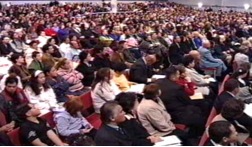Leadership Courage Series # 23
We’re looking at another characteristic of the culture of cowardice that’s become normative in North American Christianity: the 80/20 Rule is flourishing! As senior pastor, elder, or lay leader, what can you do to Undermine the 80/20 Rule in your congregation?
 One: Think like a people-developer, not a gatherer of passive spectators. Re-think why you’re in Christian ministry.
One: Think like a people-developer, not a gatherer of passive spectators. Re-think why you’re in Christian ministry.
Decide to jettison the notion—promoted by almost three hundred years of post-enlightenment Church culture—that your role primarily is to educate and entertain church dwellers. Instead, become primarily a disciple-maker and maturity-provoker. When your purpose is to catalyze people to live like Jesus, so much of the activity that fills and frustrates your workweek will change.
Think about it.
What if your senior staff took 80% of the hours it devotes to preparing for and pulling off a slick service –- an education and entertainment event – and dedicated that time to imagining ways to provoke Christ-likeness in your people?
What if you became trainers, coaches, and equippers rather than event planners and producers? What experiences would support your people’s growth into maturity?
 What skills would you be sure to have them practice: discerning God’s voice, praying for others effectively, listening well, etc?
What skills would you be sure to have them practice: discerning God’s voice, praying for others effectively, listening well, etc?- What would you have them role play: communicating parts of their Christ-story so as to connect with a variety of people in any number of typical life situations, responding biblically to universal ethical and moral challenges, selecting appropriate scriptures that might support people facing common difficulties, life experiences, and perplexities?
 What field trip experiences would be core to your disciple-making process: serving those outside the church who are culturally similar to your trainee, volunteering with secular service organizations, interviewing community leaders about the true needs of neighboring residents [police officials, mayor’s office, school administrators, YWCA director, city council members].
What field trip experiences would be core to your disciple-making process: serving those outside the church who are culturally similar to your trainee, volunteering with secular service organizations, interviewing community leaders about the true needs of neighboring residents [police officials, mayor’s office, school administrators, YWCA director, city council members].- How would you insure that your people applied whatever is taught when you do an education event? What pathways can you pave in advance of your weekend education event so that every person could take action in line with their new learning?
 Two: Stop counting the numbers of spectators who amass at your weekend events.
Two: Stop counting the numbers of spectators who amass at your weekend events.
Fix your attention on those who are making a difference for Christ.
Decide what maturing in Christ looks like in your context: serving the un-churched, giving sacrificially of one’s money, time, and talents, etc. Count those who live this way. Who contribute, who serve, who minister outside as well as inside the church.
Count only those who do.
Focus on their progress. Use them as examples when you teach and train. Make them your visible heroes.
Pay attention to their growth. Who among them is God stretching, growing, maturing, strengthening?
 What are the experiences that seem to contribute to the development of their character, confidence in ministry, trust in Christ, and tenderness of heart?
What are the experiences that seem to contribute to the development of their character, confidence in ministry, trust in Christ, and tenderness of heart?
What can you, as a senior leadership team do, to provoke your people to love and good works? [Heb 10:24]
And, while you’re doing that, wean yourself off your fixation with how many attend this or that. To undermine the 80/20 rule, stop yourself from caring about how many come and listen… to you. Stop asking about how many came and sat and took and left.
Three: Innovate ways to involve everyone, every time. A lot of people come to my church, seven services a weekend, I think. So … what if, routinely in our services, we grouped people and asked them to find someone in the group with whom they discover they have something in common, then turn that common ground into prayer?
What if our greeters grabbed the first ten strangers who walked in, and asked them to help?
What if our ushers randomly asked people to help them?
What if our trained prayer team folks picked a handful of people who they quickly trained to pray then had them come alongside and assist them when praying for others?
What if every ministry team, the weekend before they do some local ministry, randomly ask people in the service to come and do it with them? What if they kept asking until 15 people agreed to come and help?
What if you made it clear that this is a community where, from day one, everyone gives.
Where everyone contributes.
Where everyone plays.
What if giving, and contributing, and playing is how mature disciples are made?